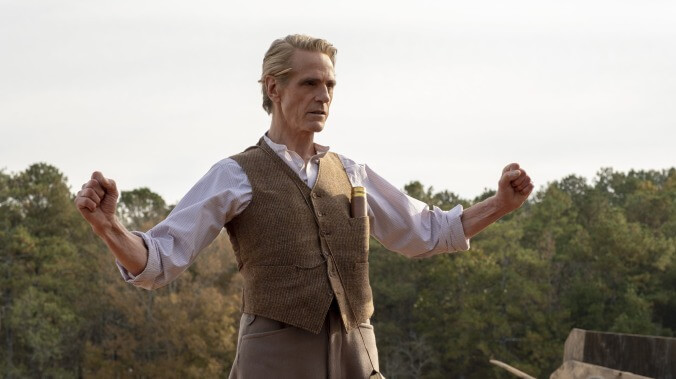Lindelof’s method of “remixing” the comics to tell a new story without contradicting what came before is both well-meaning and well-executed in “This Extraordinary Being.” But the preceding episode, “Little Fear Of Lightning,” features a remix that just contradicts things, needlessly blurring what is happening in the show and how it’s been impacted by what happened in the book. Last week, the cop-killing Seventh Kavalry militia kidnapped Tim Blake Nelson’s Wade Tillman/Looking Glass; their apparent leader, Senator Joe Keene (James Wolk), tried to break him down by showing him a video that would shatter his worldview. We learned Wade was in New Jersey in 1985 when a giant alien squid was dropped on New York and killed millions of people (as seen at the end of the comic series). In the video, Jeremy Irons’ Adrian Veidt explains to future president Robert Redford that he created the squid and killed all of those people in an attempt to scare the United States and Soviet Union into giving up their seemingly inevitable march toward nuclear war.
On the surface, this is a pretty straightforward way to introduce the truth about the squid (which comic readers already know), especially since hearing it from Veidt himself means that Wade won’t have any reason to doubt it, but it’s also a bizarrely complicated shift from the comics. That version of Veidt is never shown recording a video (and the reference to Redford’s political career is mostly a one-off joke about the divergence from our reality); the truth about his involvement in the squid attack is revealed in a different way. Just before confronting Veidt, violently paranoid vigilante Rorschach drops off his journal—containing all of his evidence against the supposed Smartest Man In The World—at his favorite tabloid newspaper. Though Rorschach dies before he can personally reveal the truth, the near-omnipotent Dr. Manhattan’s last words to Veidt (“Nothing ever ends”) and the final pages of the comic strongly imply that the peace Veidt created is more tenuous than his overconfident monologuing would imply.
We know that Rorschach’s journal was found in the canon of the show, as a page from it appears in an FBI briefing, which means that proof that Veidt staged the squid attack exists in this world already. This Veidt video, however, renders Rorschach’s journal—and therefore the actual end of the comics series—irrelevant. Rather than the seeds of his downfall coming from a questionable source like Rorschach, who knew the truth but still wouldn’t necessarily be trusted (tying in with Rorschach’s conspiracy obsessions and the Seventh Kavalry’s distrust of authority), Veidt planted the seeds himself by creating an extremely incriminating and replicable video confession.
This doesn’t sound at all like something the Veidt from the comic would do, seeing as how he makes a point to only explain his “master stroke” to Rorschach and Nite Owl once he knows there’s no possible way for them to affect the outcome. Just before that, he uses a bomb to kill everyone who helped him create the squid (even though they didn’t know about its true purpose) and poisons a group of scientists who seemingly knew exactly what he was doing and believed in his mission, presumably just so there weren’t any loose ends he’d have to worry about. And yet, despite the fact that it’s a clear shift from his behavior in the comic, the TV version of Veidt made a video that introduced a gigantic loose end and created a paper trail that directly connects him to the squid. Now, thanks to the Seventh Kavalry, it’s even being used to undermine the phony peace that he worked so hard to create—which the self-obsessed super-genius of the comic should’ve and would’ve been able to predict.
Speaking of the Seventh Kavalry, which very clearly idolizes Rorschach, this change makes the group’s motivations unnecessarily blurry. In the comic, for as much as he’s a fan favorite, Rorschach has a racist streak that underlines his extremely bitter opinion of humanity, and it makes perfect sense that his anti-social, viciously angry journal would become a holy text for a racist militia—so much so that the show could’ve gotten away with never directly explaining it. However, in giving the Kavalry this Veidt video (which is definitive proof that President Redford and his liberal cronies know the squid was a hoax), the show has turned Rorschach’s journal into a footnote, making it oddly unclear why the Kavalry worships him as much as it does—beyond his racist tendencies, of course.
It’s all confusing, and it subverts the established facts of Watchmen for seemingly no reason other than efficiency. Compare that to the Hooded Justice reveal, which took an opening in the canon and filled it in a way that introduced a new concept that wasn’t really present in the source material. The show’s “remixes” have largely been successful, offering a wider view of Watchmen’s world by focusing on a part of the country and some major social issues that were barely addressed in the book. But with one seemingly straightforward twist that does nothing but create new problems, it has revealed just how easy it is for this sort of continuation to go astray.



 Keep scrolling for more great stories from The A.V. Club.
Keep scrolling for more great stories from The A.V. Club.